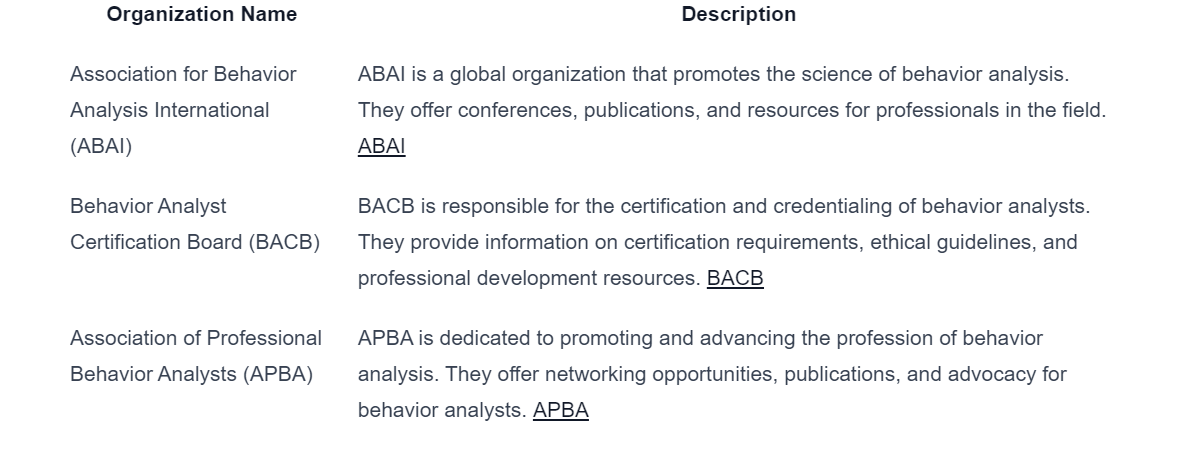Understanding ABA Therapist Salary
When considering a career as an Applied Behavior Analysis (ABA) therapist, understanding the salary landscape is essential. This section will explore the average salary for ABA therapists and the factors that influence their earnings.

Average Salary
The average salary of an ABA therapist can vary depending on various factors such as location, experience, and education. According to Salary.com, the average annual salary for ABA therapists in the United States is around $57,000. However, it’s important to note that this figure can fluctuate based on individual circumstances.
Factors Influencing Salary
Several factors can influence the salary of an ABA therapist. These factors include:
- Location: The geographical location where an ABA therapist practices can significantly impact their salary. For instance, areas with a high cost of living or high demand for ABA therapists may offer higher compensation packages.
- Experience: Like many professions, experience plays a crucial role in salary determination. ABA therapists with more years of experience and a proven track record may be eligible for higher salaries. As therapists gain expertise and demonstrate their skills, they become more valuable to employers.
- Education: The level of education attained by an ABA therapist can also affect their earning potential. A therapist with advanced degrees or specialized certifications may be more competitive in the job market and may command a higher salary.
- Employer: The type of employer can also influence an ABA therapist’s salary. ABA therapists may work in various settings, including schools, clinics, hospitals, or private practices. Each setting may offer different compensation structures and benefits.
It’s important for ABA therapists to research and understand the salary range in their specific area and consider the factors that can impact their earning potential. Additionally, staying updated on industry trends and advancements can help therapists negotiate fair compensation packages.
Understanding the average salary and the factors that influence it is crucial for ABA therapists as they navigate their career paths. By considering these factors, ABA therapists can make informed decisions about their professional growth and strive to maximize their earning potential.
Job Outlook for ABA Therapists
ABA therapists can expect a positive job outlook in the coming years, driven by the increasing demand for their specialized skills in the field of applied behavior analysis. Let’s explore the demand for ABA therapists and the growth opportunities available in this profession.
Demand for ABA Therapists
The demand for ABA therapists has been steadily rising as more individuals recognize the effectiveness of applied behavior analysis in helping individuals with autism spectrum disorder (ASD) and other developmental disabilities. ABA therapy has proven to be highly beneficial in improving social, communication, and behavioral skills in individuals with ASD.
According to the Bureau of Labor Statistics (BLS), the employment of behavior disorder and substance abuse counselors, which includes ABA therapists, is projected to grow by 25% from 2019 to 2029. This growth rate is much faster than the average for all occupations, indicating a strong demand for professionals in this field. The increasing prevalence of ASD and the need for early intervention services contribute to the growing demand for ABA therapists.
Growth Opportunities
The field of applied behavior analysis offers a range of growth opportunities for ABA therapists. As they gain experience and expertise, ABA therapists can advance their careers in various ways. Some of the growth opportunities include:
- Supervisory Roles: Experienced ABA therapists may take on supervisory roles, overseeing the work of other therapists and ensuring the quality and effectiveness of ABA programs.
- Leadership Positions: ABA therapists with leadership abilities and advanced knowledge of the field can pursue leadership positions in organizations that provide ABA services. These positions may involve program development, staff training, and implementation of best practices.
- Research and Academia: ABA therapists with a passion for research and a desire to contribute to the field’s knowledge base can pursue opportunities in research institutions or academia. They can engage in research studies, publish papers, and teach aspiring ABA therapists.
- Private Practice: Some ABA therapists choose to establish their own private practice, providing individualized ABA therapy services to clients. This allows for greater autonomy and the opportunity to shape their own practice.
The demand for ABA therapists, coupled with the potential for career growth, makes this profession an attractive choice for individuals interested in working with individuals with ASD and other developmental disabilities. ABA therapists can make a significant impact on the lives of their clients while enjoying a fulfilling and rewarding career.
Educational Requirements
To pursue a career as an ABA therapist, certain educational requirements must be met. These requirements include academic qualifications and certifications or training.
Academic Qualifications
Academic qualifications play a crucial role in becoming an ABA therapist. Most employers require a minimum of a bachelor’s degree in a related field, such as psychology, education, or behavioral analysis. However, some positions may require a master’s degree or higher, especially for more specialized roles or advanced positions.
A bachelor’s degree provides a solid foundation in the principles of applied behavior analysis (ABA) and equips individuals with the necessary knowledge and skills to work in the field. Coursework often includes topics such as behavior assessment, intervention strategies, ethics, and research methods.
Obtaining a master’s degree in ABA or a related field can further enhance career prospects and open up opportunities for higher-level positions, research, or teaching roles. Advanced coursework in ABA theory, research, and intervention techniques allows individuals to develop a deeper understanding of the field and expand their expertise.
Certifications and Training
In addition to academic qualifications, certifications and training are essential for ABA therapists. These credentials demonstrate a therapist’s competency and adherence to professional standards. The most recognized and widely sought-after certification for ABA therapists is the Board Certified Behavior Analyst (BCBA) credential.
To become a BCBA, individuals must complete a master’s degree in ABA or a related field, fulfill specific coursework requirements, gain supervised experience, and pass the BCBA examination. This certification signifies expertise in the field of applied behavior analysis and opens doors to a wider range of job opportunities and higher salary potential.
Apart from the BCBA credential, there are other certifications and training programs available that can supplement an ABA therapist’s qualifications and enhance their skills. These may include specialized certifications in areas such as autism spectrum disorders, developmental disabilities, or specific age groups.
Continuing education and ongoing professional development are also crucial for ABA therapists to stay updated with the latest research, techniques, and best practices in the field. Attending workshops, conferences, and training programs allows therapists to expand their knowledge and refine their skills.
By meeting the educational requirements and obtaining relevant certifications, ABA therapists can enhance their professional qualifications and increase their chances of securing rewarding positions in the field. Continuous learning and professional development contribute to their growth as practitioners and enable them to provide effective interventions and support to individuals with behavioral challenges.
Work Environment
As an ABA therapist, the work environment can vary depending on the setting in which they provide their services and the population they work with. Let’s explore the typical settings and duties of ABA therapists.
Settings for ABA Therapists
ABA therapists can work in a variety of settings, including:
- Schools: Many ABA therapists work in educational settings, providing support to students with autism and other developmental disorders. They collaborate with teachers, parents, and other professionals to implement individualized behavior intervention plans and promote the inclusion and success of their clients.
- Clinics: ABA therapists may work in private clinics that specialize in providing ABA therapy services. These clinics often offer a structured and supportive environment for clients to receive therapy. ABA therapists in clinics may work with clients of different ages and developmental levels, tailoring interventions to meet their specific needs.
- Homes: Some ABA therapists provide in-home therapy services. Working directly in the client’s home allows for a more personalized and familiar environment, promoting generalization of skills across different settings. In-home ABA therapy can be particularly beneficial for young children and individuals who require intensive interventions.
- Community-based programs: ABA therapists may also work in community-based programs that aim to support individuals with developmental disabilities. These programs can include day programs, after-school programs, and other community settings where individuals can engage in social and recreational activities while receiving ABA therapy.
Typical Duties
The duties of ABA therapists can vary depending on the specific needs of their clients and the setting in which they work. Some of the typical duties of ABA therapists include:
- Assessment and Evaluation: ABA therapists conduct assessments to identify the strengths and areas of need for their clients. They use various assessment tools and techniques to gather data and develop individualized treatment plans.
- Design and Implementation of Behavior Intervention Plans: Based on the assessment results, ABA therapists develop behavior intervention plans that target specific skills and behaviors. They implement evidence-based strategies and techniques to teach new skills, reduce challenging behaviors, and promote independence.
- Data Collection and Analysis: ABA therapists collect data on client progress and behavior during therapy sessions. They analyze the data to track progress, make adjustments to interventions, and evaluate the effectiveness of the treatment plan.
- Collaboration and Communication: ABA therapists work closely with clients, families, and other professionals involved in the client’s care. They collaborate to ensure consistency and generalization of skills across different environments. ABA therapists also provide regular feedback, progress updates, and recommendations to parents and caregivers.
- Documentation and Reporting: ABA therapists maintain detailed records of client progress, session notes, and any changes made to the treatment plan. They may also prepare reports and summaries for other professionals involved in the client’s care, such as teachers, physicians, or speech therapists.
By understanding the different settings and duties of ABA therapists, individuals interested in pursuing this career can gain insight into the diverse work environments and responsibilities involved. Whether in schools, clinics, homes, or community-based programs, ABA therapists play a crucial role in helping individuals with developmental disorders thrive and reach their full potential.
Salary Disparities
When it comes to the salary of ABA (Applied Behavior Analysis) therapists, several factors can contribute to disparities in earnings. In this section, we will explore two key factors that can result in salary discrepancies: regional differences and variances based on experience.
Discrepancies by Region
The salary of an ABA therapist can vary significantly depending on the region in which they work. Factors such as cost of living, demand for ABA services, and local economic conditions can all impact salary ranges.
To provide a general idea of regional differences, the table below showcases the average salaries for ABA therapists in select regions of the United States. It’s important to note that these figures are approximate and can vary based on individual circumstances.

Variances Based on Experience
Experience is another significant factor that influences the salary of ABA therapists. As professionals gain more experience in the field, their expertise and skills grow, often resulting in increased earning potential.
The table below outlines the average salaries for ABA therapists based on their level of experience. These figures are meant to provide a general understanding and may vary depending on other factors such as education and location.

It’s important to note that these salary ranges are approximate and can vary based on factors such as location, education, certifications, and the organization or setting in which the ABA therapist works.
Understanding the salary disparities based on region and experience can help individuals make informed decisions about their career path and expectations. It’s essential for ABA therapists to consider these factors when negotiating salaries and planning for professional growth.
Resources for ABA Therapists
As an ABA therapist, it’s important to stay connected with professional organizations and take advantage of career development opportunities. These resources can provide valuable support, networking opportunities, and access to continuing education to help you grow in your career.
Professional Organizations
Joining professional organizations related to Applied Behavior Analysis (ABA) can offer numerous benefits for ABA therapists. These organizations provide a platform for networking with other professionals in the field, staying updated with the latest research and industry trends, and accessing resources that can enhance your knowledge and skills.
Here are a few notable professional organizations for ABA therapists:

By becoming a member of these organizations, you can connect with like-minded professionals, attend conferences and workshops, and access resources that can enrich your career as an ABA therapist.
Career Development Opportunities
Continual professional development is essential for ABA therapists to enhance their skills and stay current with advancements in the field. Fortunately, there are various career development opportunities available that can help you expand your knowledge and expertise.
Here are some avenues for career development:
- Continuing Education Courses: Many organizations and universities offer continuing education courses specifically tailored for ABA therapists. These courses cover topics such as advanced behavior analysis techniques, ethics, and specialized areas of practice.
- Workshops and Conferences: Attending workshops and conferences allows you to learn from experts in the field, gain insights into the latest research, and network with other professionals. Organizations like ABAI and APBA organize annual conferences that provide valuable learning and networking opportunities.
- Supervision and Mentoring: Seeking supervision and mentoring from experienced ABA professionals can be immensely beneficial for your professional growth. Working closely with a mentor can provide guidance, feedback, and support as you navigate your career as an ABA therapist.
- Research and Publications: Engaging in research and contributing to publications within the field of ABA can help you establish yourself as an expert and advance your career. It allows you to contribute to the body of knowledge and share your insights with the broader ABA community.
By actively participating in these career development opportunities, you can continuously enhance your skills, stay informed about new research and best practices, and open doors to new opportunities in your career as an ABA therapist.
References
- https://www.salary.com/research/salary/benchmark/applied-behavior-analysis-therapist-salary
- https://www.betterup.com/blog/what-is-my-earning-potential
- https://www.indeed.com/career-advice/career-development/compensation-packages

 We've just released an article!
Check out our blog!
We've just released an article!
Check out our blog!



